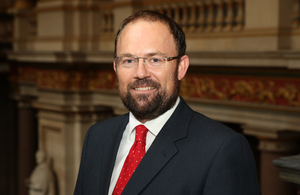New law to resolve remaining COVID-19 commercial rent debts now in place
- New law comes into effect to provide a legally binding arbitration process to resolve certain outstanding commercial rent debts related to the pandemic
- commercial landlords and tenants encouraged to negotiate agreements using the Code of Practice
- if they cannot agree, the new binding arbitration system can be used as a last resort for eligible businesses
- general moratorium on commercial evictions ends today
A new law is now in place to help resolve certain remaining commercial rent debts accrued because of the pandemic, Business Minister Paul Scully has announced today (Thursday 24 March).
The ‘Commercial Rent (Coronavirus) Act 2022’ received Royal Assent today. This means that from today a legally binding arbitration process will be available for eligible commercial landlords and tenants who have not already reached an agreement. This will resolve disputes about certain pandemic-related rent debt and help the market return to normal as quickly as possible.
The law applies to commercial rent debts of businesses including pubs, gyms and restaurants which were mandated to close, in full or in part, from March 2020 until the date restrictions ended for their sector. Debts accrued at other times will not be in scope.
The law comes into force today in England and Wales.
Business Minister Paul Scully said:
This new law will give commercial tenants and landlords the ability to draw a line under the uncertainty caused by the pandemic so they can plan ahead and return to normality.
Landlords and tenants should keep working together to reach their own agreements where possible using our Code of Practice to help them, and we’ve made arbitration available as a last resort. Tenants who can repay their rent debts in full, should do so, and when they cannot, landlords should try to share the burden, so we can all move on.
The government encourages commercial landlords and tenants to negotiate their own agreement where possible, so that an arrangement to resolve debt is mutually agreed, instead of resorting to the arbitration process.
Today is the last day of the general moratorium on commercial evictions and restrictions on Commercial Rent Arrears Recovery (CRAR) in England and Wales, but eligible firms remain protected for the next 6 months during which arbitration can be applied for or until the conclusion of an arbitration.
The moratorium has provided firms with breathing space to negotiate how to address the cost of commercial rent debts caused by the pandemic before the new law came into place.
Last year, the government published an updated Code of Practice to provide commercial landlords and tenants with a clear process for settling outstanding debts. The Code sets out that tenants who can pay their rent debt in full should do so, and that in the first instance, tenants unable to pay in full should negotiate with their landlord in the expectation that the landlord shares the burden where they are able to do so, and only as far as necessary, by waiving some or all rent arrears or giving time to pay.
The Code of Practice applies across the UK. The ‘Commercial Rent (Coronavirus) Act’ applies to England and Wales. Scotland has adopted an alternative approach to commercial evictions since the start of the pandemic, due to different property legislation and market conditions.
For those tenancies that fall within scope of the Act and have failed to reach agreement, either party can apply for arbitration unilaterally, as a backstop after negotiations have failed. Parties are free to continue to negotiate outside of the legal arbitration process. The Code signposts tenants and landlords to forms of alternative dispute resolution, such as mediation, if they wish to pursue this.
The window to apply for arbitration will be six months from the date legislation comes into force. Arbitrators may award a reduction of protected rent debt and/or time to pay, with a maximum period to repay of 24 months.
The legal arbitration process will be delivered by arbitrators appointed by approved arbitration bodies from a list of suitable and available arbitrators.
Arbitration bodies will have to go through an approval process to demonstrate their suitability to administer the scheme. BEIS will publish a list of approved arbitration bodies in due course, and where a dispute is eligible, landlords or tenants will be able to apply directly to any approved arbitration body to appoint an arbitrator.
BEIS and DLUHC will also issue further guidance to landlords and tenants as well as to arbitrators on how the process will work for all parties.
